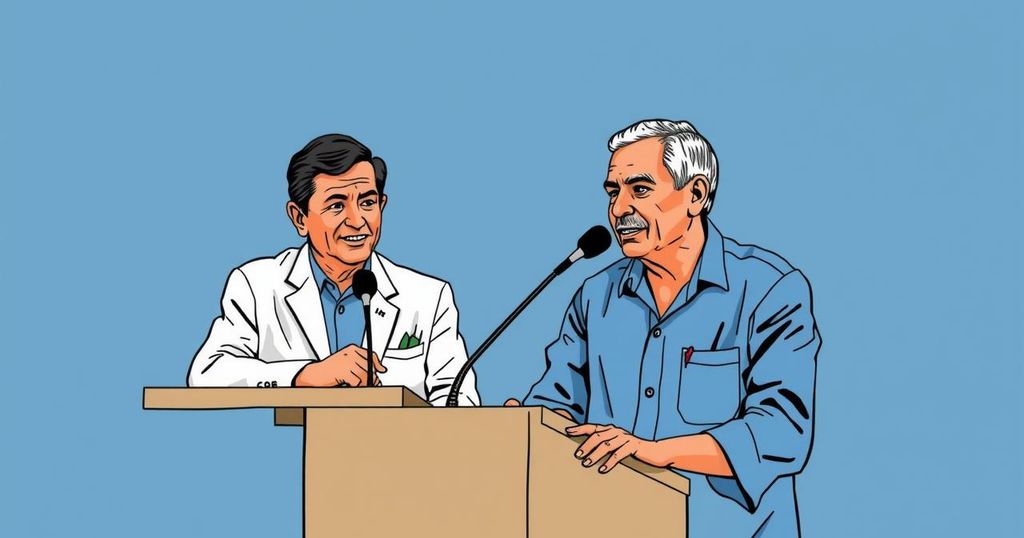Uruguay’s Presidential Election: A Reflection of Stability Amidst Regional Turmoil

Uruguay recently held a presidential election featuring two moderate candidates, Álvaro Delgado and Yamandú Orsi, amidst high voter turnout and significant engagement in a referendum concerning social security reform. The election highlighted the country’s political stability amidst regional tumult and reflected a shared consensus on critical social issues.
On a recent Sunday, the voters of Uruguay engaged in a critical electoral process, selecting a new president among two moderate candidates amidst a backdrop of regional political turmoil characterized by polarization and democratic degradation. With the participation of approximately 2.7 million eligible voters, who also cast ballots for the Parliament and a significant referendum regarding modifications to the social security system, the election took place under the auspices of high civic engagement, with turnout exceeding 88 percent. This election, widely seen as a reflection of Uruguay’s long-standing political stability, featured a contest between the ruling center-right coalition and a center-left coalition contestant. The current president, Luis Lacalle Pou, is ineligible for re-election due to constitutional term limits, prompting his chief of staff, Álvaro Delgado, to run as the governing party’s candidate. In juxtaposition, the main challenger, Yamandú Orsi, hails from the Frente Amplio coalition, which previously governed the country from 2005 to 2020, and he seeks to regain the presidency for his faction. Though polls indicated Orsi leading with 44 percent, the prospect of a run-off remains possible should he fail to secure an outright majority. The social security referendum has notably captured public attention, as it seeks to reform a system acknowledged for its fiscal implications in one of Latin America’s more affluent nations. Both presidential candidates have voiced opposition to the reform, underscoring the consensus in the electoral discourse concerning fiscal responsibility and social programs. Despite this atmosphere of general agreement, issues including child poverty, education, and security have been pivotal discussion points during the campaign. Uruguay has been characterized as a model of democratic stability within the region, with citizens expressing a collective contentment with the administration’s business-oriented policies and the nation’s steady economic growth. In contrast to other South American countries currently experiencing political upheaval, the political atmosphere in Uruguay remains relatively calm and calculated, reflective of the public’s overall satisfaction with the status quo. Political analysts have underscored the importance of this election in maintaining the integrity of democracy that has been in place since the end of a military dictatorship in the 1980s. Adding to the political landscape, former President José “Pepe” Mujica, revered for his progressive governance, actively supported Orsi while courageous in battling health challenges. His presence serves as a representation of Uruguay’s commitment to democratic principles and the ongoing engagement of past leaders in current affairs. As the electoral results were awaited, the country exhibited a vibrant commitment to democracy, underlined by its participatory measures in its political processes. The final outcome, expected imminently, holds significant implications for the nation’s future direction, particularly in the context of a widely anticipated adjustment to social security policies.
Uruguay has cultivated a reputation for political stability amidst a Latin American landscape often rife with division and unrest. With compulsory voting laws, the nation experiences consistently high voter turnout, reflecting a robust civic engagement among its citizens. The prevalence of moderate political candidates in the electoral landscape demonstrates a departure from the populist surge seen in neighboring countries. As Uruguay navigates issues such as economic growth, social security reform, and public safety, the significance of the upcoming election cannot be understated; it represents a critical juncture in determining the future of governance and social policies in this small yet influential nation.
The recent electoral process in Uruguay underscores the country’s dedication to democratic values and political stability. As voters cast their ballots in a polarized regional context, the presence of moderate candidates reflects a prevalent satisfaction with current governance. Key issues concerning social security and public welfare continue to dominate the political discourse, indicating that, regardless of the election outcome, the nation remains focused on maintaining its social contract and addressing the complexities of modern governance while remaining a beacon of stability in South America.
Original Source: www.pbs.org








